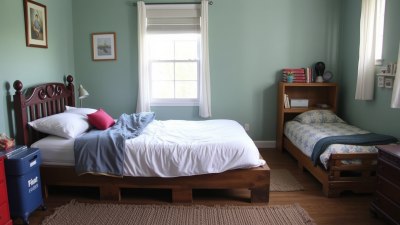How to Sleep in a Hostel Without Dealing With Annoying Roommates
Discover clever strategies to make your hostel stay comfortable and peaceful, even with noisy or disruptive roommates

Image by veresproduction on Freepik
Staying in a hostel is a budget-friendly way to travel, but let’s be honest—shared dorms can come with their challenges, especially when it comes to getting a good night’s sleep. Whether it’s noisy roommates, unpredictable bedtimes, or the constant shuffle of people coming and going, it can be tough to find peace in a hostel. However, with a few clever strategies, you can sleep soundly despite the hostel chaos. Here are some tips to help you sleep in a hostel without dealing with annoying roommates.
1. Choose Your Bed Wisely
When you check into a hostel, one of the first things you should do is pick your bed carefully. If you have the option, choose a bed away from the door, the bathroom, or the common areas. These spots tend to experience more foot traffic, which can lead to noise. Ideally, opt for a bed in the back corner or near a window (if it’s quieter). If you’re a light sleeper, consider booking a top bunk, as they tend to be a bit more secluded and have less direct foot traffic compared to bottom bunks.
2. Invest in Quality Earplugs
Noise is one of the biggest issues in hostels, with everything from snoring roommates to late-night conversations or the sounds of people coming in and out. The best way to combat this is by investing in a good pair of earplugs. Quality earplugs can block out a lot of the ambient noise, allowing you to sleep more soundly. If earplugs don’t work for you, noise-canceling headphones can also do the trick, especially if you prefer something more comfortable or effective. Just be sure to test out different options until you find what works best for you.
3. Use an Eye Mask
Hostels are often brightly lit, especially in shared dorms where people come and go at all hours. If you find it difficult to sleep in a well-lit environment, an eye mask can help create a dark, calming space for you. Eye masks are compact, affordable, and easy to carry, making them an ideal travel companion for anyone staying in a hostel. Pair an eye mask with earplugs for a truly peaceful, uninterrupted sleep.
4. Sleep During Off-Peak Hours
Most hostels have a lot of activity during certain hours, particularly at night when everyone is coming back from exploring or partying. If you’re a light sleeper, consider adjusting your schedule to sleep during quieter times of the day. Many hostels have quieter periods in the afternoon or early morning, especially when everyone is out sightseeing. If you’re an early riser, try to get some rest while the dorm is calmer, and if you’re a night owl, take advantage of the quieter late-night hours when most people have gone to bed.
5. Talk to Your Roommates (Politely)
If your roommates are being disruptive, sometimes the best approach is simply to communicate with them. If someone is being especially loud or inconsiderate, kindly ask if they could keep the noise down or adjust their behavior. Most people are respectful when approached politely. If you feel uncomfortable confronting someone, you can always speak to the hostel staff and ask for assistance. Hostels often try to maintain a friendly and respectful atmosphere, and they may take steps to ensure your comfort.
6. Bring a White Noise Machine or App
If earplugs and an eye mask aren’t enough to block out the noise, you can try using a white noise machine or app. These devices or apps produce a consistent, calming sound that can drown out background noise, helping you sleep better in a shared environment. Many white noise apps are free and easy to download on your phone. Alternatively, portable white noise machines are inexpensive and can be easily carried in your luggage. The sound can also help cover up any sudden noises that might otherwise disturb your sleep.
7. Keep Your Space Tidy and Organized
One source of stress in hostels is clutter, especially in shared dorm rooms. When everyone’s stuff is scattered around, it can make the space feel chaotic and uncomfortable. Keeping your area tidy and organized will not only help you feel more at ease, but it will also make it easier to navigate the room when others are asleep. Consider packing in a way that keeps your belongings contained, using packing cubes or a small suitcase to keep everything neat. This will help you avoid tripping over items or dealing with a messy space when it’s time to relax.
8. Choose Hostels with Smaller Dorms
If you’re sensitive to noise or find large dorms overwhelming, try booking a hostel with smaller dorm rooms. Smaller dorms often have fewer roommates, which means less noise and less likelihood of disruptive behavior. Some hostels offer private rooms or “quiet dorms” where guests are expected to maintain a more peaceful environment. If you can afford a slightly higher price, a smaller or private room might be worth the investment for a more restful experience.
9. Use Headphones for Music or Meditation
If you find it hard to block out noise completely, try using headphones to listen to calming music or guided meditation. Music, nature sounds, or even sleep-inducing podcasts can help distract you from the noise around you and lull you into a peaceful slumber. Many people find that listening to something soothing can improve their sleep quality, even in shared spaces. Consider downloading playlists or apps like Calm or Headspace that provide calming audio for relaxation and sleep.
10. Consider Hostels with Better Sleep Policies
Some hostels have implemented policies that prioritize quiet hours or enforce a “no loud noises” rule. If you’re sensitive to noise, look for these hostels that foster a more relaxed atmosphere. Read reviews on platforms like Hostelworld or Booking.com to check if a hostel has good sleep quality or offers specific dorms with peace policies. Many travelers appreciate hostels that promote relaxation and rest, which can make your stay much more comfortable.
While staying in a hostel can sometimes feel challenging due to noise and roommate disruptions, these tips can help you sleep better and make the most of your budget-friendly accommodation. By taking a few simple steps, like choosing your bed wisely, using earplugs or an eye mask, and being proactive about communicating with your roommates, you can ensure that you get a peaceful night’s sleep. Sweet dreams!











